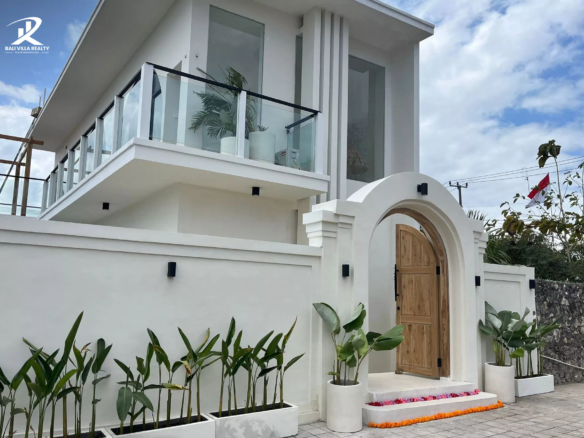You’ve seen the Bali villas, the beaches, the lifestyle. But is Bali really a safe place to live?
We get the concern. Many of our clients, especially first-time investors, have asked the same question.
The truth is, Bali can absolutely be a safe and rewarding place to live. But, only if you know how to navigate the system.
In this article, we’ll walk you through some essential tips to help ensure your experience in Bali is safe and your investment secure. This guide is perfect for you if:
- You’ve never visited Bali before
- You’re a foreign investor considering buying property here
- You need clear, actionable steps to avoid common mistakes
Let’s break down everything you need to know, step by step!

Get a Customized Investment Plan in Bali
With over 15+ years in the market, here’s what we can do for you:
- Find the best location to invest in Bali.
- Reliable guidance on Bali’s property market and laws.
- Personalized strategy to maximize returns and meet your financial goals.
Contents
Key Takeaways
- Bali is generally a safe and welcoming place to live, with a strong expat community, improving infrastructure, and family-friendly amenities.
- However, some downsides of living in Bali include limited public transportation, visa challenges, and occasional petty crime.
- In terms of investment, Bali property offers strong ROI potential (8–12%), especially in popular areas like Canggu and Seminyak.
- Foreigners can safely invest in Bali villas by taking the right steps: researching ownership types, verifying the seller, checking permits, conducting due diligence, and working with a trusted local notary.
Is Bali a Good Place to Live?
Absolutely! Bali has been an amazing place to live for solo travelers, families with kids, and even women moving here on their own.
The local people are incredibly warm and respectful. There's a strong sense of community here, and you really feel it in everyday life.
Balinese culture values kindness and connection, which makes it easy to settle in, even if you're new.
The island is also getting easier to navigate. Roads are improving, and more public facilities are popping up, so, moving around isn’t as hard as it used to be.
If you’re moving in with family, you’ll find everything you need: international and local schools, hospitals, gyms, daycares, grocery stores, even malls and amusement parks.
Some of our clients with kids say their children really enjoy the outdoor activities here—there’s no shortage of things to do.
And the expat scene? Super welcoming.
You’ll easily meet others from your home country, especially in areas like Canggu, Ubud, or Sanur. It doesn’t take long before you feel like you’re part of a little international village.
Read More: Common Mistakes Foreigners Make When Investing in Bali Real Estate
5 Tips for Risk-Free Villa Purchase Bali

Interested in moving to Bali? Before that, you’ll need to own a property here. Here are the steps to make sure your investment is safe:
1. Do Your Research
Yes, it sounds obvious, but thorough research is your first defense against making a bad investment.
Understand the different types of ownership (like leasehold vs. freehold), know the zoning laws, and find out which areas are best for investment.
This is not a step rush. Take your time to learn the rules of Bali’s property market, so you can make smarter decisions and avoid costly mistakes.
Read More: How to Know You’re Paying the Right Price for Your Property in Bali
2. Conduct a Site inspection
Once you’ve researched, you’ll have a good idea of what you want to invest in.
But here’s the thing: what you see online often differs from reality. That’s why it’s crucial to visit the property in person.
If you can’t be there physically, hire someone you trust, like a notary or a local expert, to inspect the property. They’ll ensure the condition matches the listing and no hidden issue await you later.
3. Verify the Seller’s Legitimacy
This step is critical. In Bali, properties are often passed down through families, and it’s not uncommon for one property to have multiple owners.
You need to ensure that the person selling the property has the legal right to do so—and that no other family members or individuals have ownership claims.
If you don’t verify the seller’s legitimacy, you risk buying a property that could result in legal disputes. Make sure you’re dealing with the rightful owner before signing anything.
4. Review Building Permits & Legality
You must ensure the property is zoned for your intended use, especially if you plan to build or renovate.
For example, buying a villa to rent out must be in the pink zone which is an area designated for tourism and commercial use.
Skipping this step could mean buying restricted land or land without the right permits.
Without the correct zoning and permits, you could face hefty fines or even have to tear down what you’ve built.
Read More: Bali Land Zoning Explained: 6 Area to Watch Out
5. Secure Your Finances the Right Way
Finally, you should always use a trusted local notary when paying for your property.
In Bali, sending money to a notary is standard practice, not directly to the developer or seller. This keeps your money secure until the transaction is fully verified.
Also, remember about taxes and fees, such as land taxes, notary fees, and any taxes related to a leasehold agreement.
Using a notary ensures your money is safe and the transaction is handled legally. This is a key step to prevent fraud or losing your funds.
For detailed information on each of these processes, visit our complete guide here: Invest in Bali with High ROI: Verified Guide by Trusted Local Real Estate Agent
The Downsides of Living in Bali to Watch Out For

As a rental property agent who handles overseas clients, we’ve also heard some of the downsides of living in Bali as an expat.
We’ve summarized a few challenges that some of our clients have personally experienced, so you can stay informed and better prepared before moving in:
1. It Can Feel Isolating
Being far from family and old friends can hit harder over time. While there’s a big expat community here, people tend to come and go.
If you're someone who values long-term relationships, this can be emotionally challenging.
Read More: The Bali Breakup Curse in Tanah Lot That Haunts Couples: Debunked!
2. Limited Public Transportation
One thing that surprises many foreigners is the lack of public transport like subways or commuter trains.
Bali does have a bus system called Trans Metro Dewata (TMD), but the routes are limited mostly in the capital city, which is Denpasar.
So if you’re living in a rural area, getting around can be a challenge.
Many foreigners rely heavily on ride-hailing apps like Grab or Gojek—which aren’t always available in remote areas, during peak hours, or in bad weather.
3. Scooter Travel Has Real Safety Risks
Scooters are convenient, but not always safe. Roads are often congested, traffic rules are loosely followed, and drunk driving still occurs.
Many foreigners ride without helmets or proper safety gear and may not have experience driving in Bali’s traffic, putting themselves at serious risk.
4. Bali Belly is Real
If you stay in Bali long enough, chances are you’ll experience what people call “Bali Belly”. It's a common nickname for food-related stomach issues.
Symptoms include upset stomach, nausea, or diarrhea. While it’s rarely serious and considered "part of adjusting to island life", it can definitely ruin a few days of your stay.
To avoid it, stick to bottled water, eat at places with good hygiene, and be cautious with street food until your stomach adjusts. Some expats even carry charcoal pills or probiotics just in case.
5. Petty Theft Still Happens
Bali is generally safe, but petty crime—like pickpocketing or bag snatching—does happen, especially in tourist-heavy areas.
Always keep your belongings secure and avoid flashing valuables in public.
6. Visa Rules Can Be a Headache
Dealing with visas is one of the more frustrating parts of living in Bali.
The rules change often, the process can be confusing, and long-term stays require proper planning and regular renewals.
Many expats use visa agents to help navigate the process.
Is Bali Safe for Property Investment?

Yes, Bali is a safe spot for property investment, offering around 8–12% ROI.
Bali’s real estate market is still booming, with strong demand for villas, rental properties, and commercial spaces, especially in popular areas like Canggu, Seminyak, and Uluwatu. Many investors, both local and expat, have found great success here.
But like any investment, there are risks to watch out for, especially for foreigners.
For example, the laws around property ownership in Indonesia can be complex. Not understanding the rules could lead you to legal trouble or financial loss.
Start Your Search: Available Bali Villas for Sale - Leasehold and Freehold
Conclusion: Invest in Bali Safely and Legally
Is Bali a safe place to live? The short answer is yes.
Sure, you might hear a few "horror stories", but most of them can be avoided if you know what to expect, how to prepare, and how to invest wisely.
That’s why we always recommend taking your time to do proper research and due diligence before making any decisions.
And if you need help along the way, our team of real estate experts is here to guide you through every step.
Book a free consultation below and let’s make your Bali property investment safe, legal, and stress-free.
Want to start investing in Bali property?
Have a quick chat with our real estate experts for personalized advice on your Bali investments. No commitment required.









